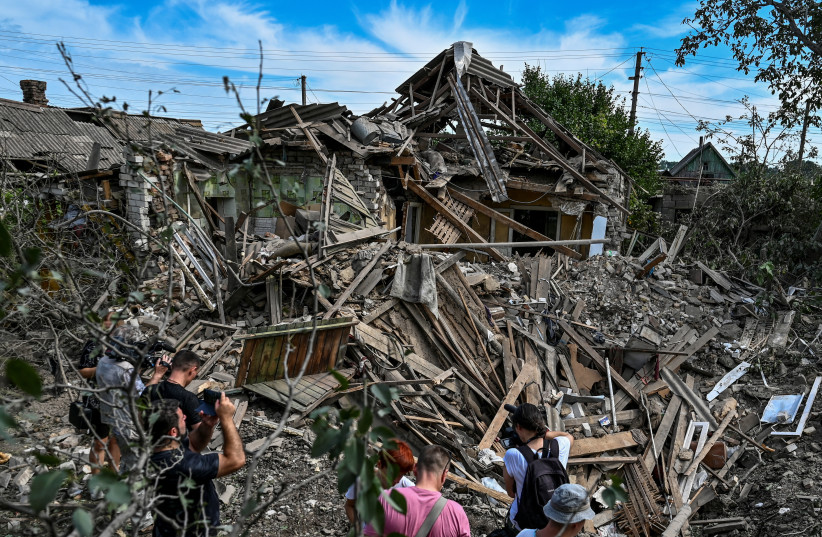If victory is defined as the attainment of certain war aims, Russia can no longer win in Ukraine – even though it has repeatedly altered, scaled down and revamped those aims.
At first, when Putin announced the start of his Special Military Operation in Ukraine on February 24, Russia planned to “demilitarize” and “denazify” Ukraine, which meant swiftly capturing Kyiv, arresting President Volodymyr Zelensky and installing a puppet regime. Large portions of Ukraine’s eastern and southern regions would then be annexed, leaving a rump state without access to the Black Sea.
That plan failed, as did the next, less radical version that included taking Odesa and creating a land corridor to Transnistria, the self-proclaimed pro-Russian enclave of Moldova that borders Ukraine.
Putin then scaled down his ambitions further, limiting them to the occupation of the entire territory of Ukraine’s Donetsk and Luhansk Oblasts. Once again Ukrainians thwarted his plans and started to liberate the territories that they had ceded in the early weeks of the invasion.
Since early September, the Ukrainian armed forces, armed with more technologically advanced weaponry provided by Western allies, have turned the tide of war and begun to crush the Russian invasion force. As his generals surrender more territory, Putin has very few resources to stem the retreat. His regular army has been decimated; fresh recruits called up since the start of the partial conscription on September 21 are untrained, under-equipped and unmotivated.

Russia’s advanced weapons have been mostly used up and Western sanctions prevent their replenishment. Even producing them at home has become impossible since most hi-tech components are imported and therefore unobtainable. The Defense Ministry has been forced to take obsolete Soviet tanks and rocket launchers out of warehouses where they had been mothballed for decades. Russia is going hat-in-hand around the world in search of weapons, obtaining drones from Iran and shells from North Korea, two other pariah nations.
Why is Putin still fighting?
YET, PUTIN IS still casting about for a victory – any victory – which he could present to his constituency at home. He is now trying to bring Zelensky to the negotiating table. Since the Ukrainians refuse to negotiate, he has adopted a three-prong strategy to twist their arm.
On October 10, he started to bomb vital civilian infrastructure across Ukraine in order to deprive Ukrainian cities of power and heat as the weather turns cold. At the same time, Russia’s Gazprom has curtailed supplies of natural gas to Western Europe in the hope that Europeans, too, will freeze in winter and pressure Ukraine to make concessions.
Overarching these two prongs is the scariest of all: Putin is brandishing tactical nuclear weapons and threatens to use them if he doesn’t get his way.
Putin’s goal is to get Kyiv to recognize Russian sovereignty over Crimea (which Russia annexed in 2014) and to allow Russia to hold on to the Ukrainian territories it still occupies, creating a land link to Crimea. It is not much, especially in light of the high hopes in February, but Putin believes that it is a victory of sorts and that in any case, it is preferable to a humiliating defeat.
Actually, both for Russia and for Putin it would be a disaster. If he rams a settlement down Ukraine’s throat by continuing to bomb Ukrainian cities and killing women and children, as well as by means of nuclear blackmail, he will solidify Russia’s perception around the world as a pariah state. International sanctions will not be lifted and may even become entrenched, the way they were in the case of Iran and, earlier, Saddam Hussein’s Iraq.
Russian oil and gas will not return to European markets anywhere near the volumes that prevailed before the invasion of Ukraine, as Europe’s sources of supply have already been diversified, thanks also to supplies from Israel. Cultural, political and athletic contacts will remain severed.
Some one million people – mostly young educated professionals – who fled conscription in recent weeks will stay abroad – both because they will fear arrest and because the impoverished Russian economy will no longer offer them job opportunities.
<br><br>Putin needs to admit that he has already lost
PUTIN NEEDS to admit defeat. As a prerequisite to negotiations, he should agree to withdraw from all occupied territories – including Crimea and the Donbas – as well as to pay Ukraine significant reparations over time, in exchange for a comprehensive settlement that will include guarantees of safety for himself and the lifting of economic sanctions.
Given the power of his propaganda machine and his authoritarian control over Russian society, even the perception of humiliation may be tempered, whereas the return to normalcy after eight months of war, isolation and economic turmoil will be warmly welcomed by a majority of the Russians population.
Putin is hoping to rule for a long time, starting with another seven-year term after the 2024 presidential election. At least if he shows considerable flexibility now he will have a chance to see Russia return to economic growth and development before leaving office – which he plans to do feet first, in the tradition of most of his Soviet predecessors.
From the Western and Ukrainian points of view, leaving Putin in power and negotiating with him may seem morally repugnant, but since this will save thousands of lives that would otherwise be lost in Ukraine, it is probably a good price to pay.
Born in the USSR, the writer has lived in the US since 1975, having emigrated on an Israeli visa during the Let My People Go campaign for Soviet Jewry. He has worked as an economist for 35 years, including positions at Standard and Poor’s and The Economist Intelligence Unit. Over the past 10 years, he has published four murder mysteries set in Moscow in the 1960s.
